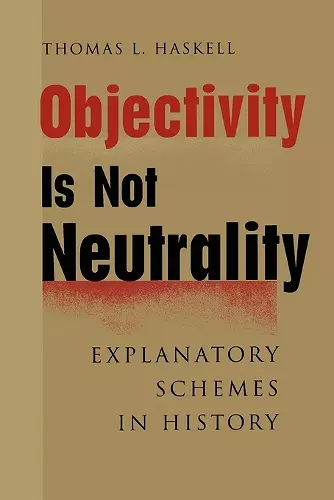Objectivity Is Not Neutrality
Explanatory Schemes in History
Format:Paperback
Publisher:Johns Hopkins University Press
Published:10th Jan '01
Currently unavailable, and unfortunately no date known when it will be back

In Objectivity Is Not Neutrality, Thomas L. Haskell argues for a moderate historicism that acknowledges the force of perspective and reaffirms the pluralistic practices of a liberal democratic society-even while upholding time-honored distinctions between fact and fiction, scholarship and propaganda, right and might. Haskell addresses questions that will interest philosophers and literary theorists no less than historians, exploring topics ranging from the productivity of slave labor to the cultural concomitants of capitalism, from John Stuart Mill's youthful "mental crisis" to the cognitive preconditions that set the stage for antislavery and other humanitarian reforms after 1750. He traces the surprisingly short history of the word responsibility, which turns out to be no older than the United States. He examines the reasons for the rising authority of professional experts in nineteenth-century America. And he wonders whether the epistemological radicalism of recent years leaves us with any adequate basis for justifying human rights-rights of academic freedom, for example, or the right not to be tortured. Written by a thoughtful critic of the historical profession, Objectivity Is Not Neutrality calls upon historians to think deeply about the nature of historical explanation and to acknowledge more fully than ever before the theoretical dimension of their work.
Haskell's method integrates the disciplinary priorities of historians into a style of discourse characteristic of philosophers, theologians, and political theorists... The community of specialists [in U.S. history] has no more thoughtful and conscientious student of its own epistemic authority than Thomas L. Haskell. -- David A. Hollinger Journal of American History A dozen essays, thoughtful and thought-provoking, by a distinguished intellectual historian and historical critic. Virginia Quarterly Review The most sophisticated contribution by a historian to the contemporary debate over the nature of historical knowledge. Books and Culture Haskell's reputation as one of the foremost writers on topics in the philosophy of history is well deserved... A challenging read well worth the effort. Choice Haskell provides a deeper understanding of the relationship between professional societies and authoritative knowledge and how this led to the rise of distinctive intellectual societies. PAR Public Administration Review 2006
ISBN: 9780801865350
Dimensions: 229mm x 152mm x 23mm
Weight: 635g
440 pages